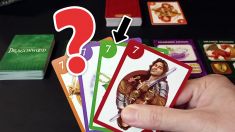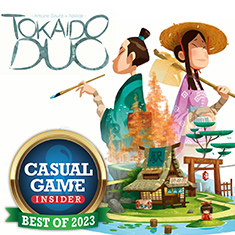Use Deduction, Memory, and Tactics to Win in TacTiki
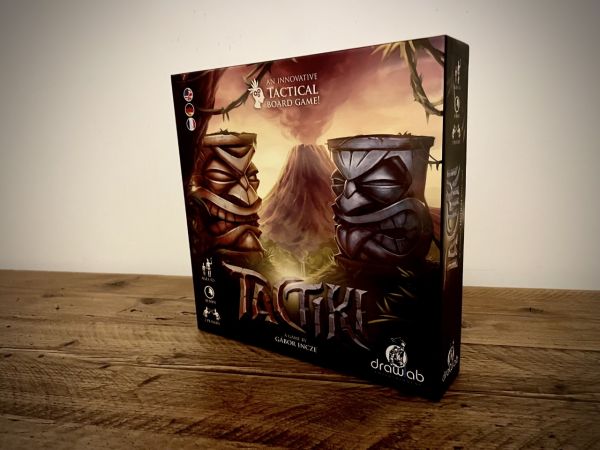
TacTiki is an abstract strategy game that requires players to use tactics and planning to win. With a strong memory aspect, TacTiki challenges players in a fascinating duel and will remind you of timeless classics such as chess.
TacTiki offers an engaging and competitive experience for everyone involved. TacTiki is designed for two players, recommended for players aged eight years old or higher, and lasts between 20-30 minutes.
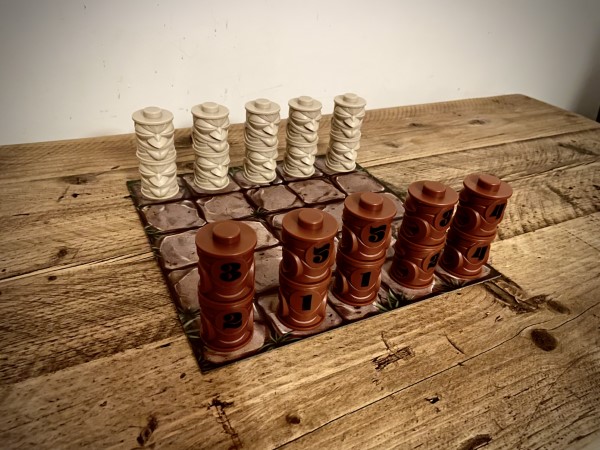
Gameplay
In TacTiki, your goal is to travel to the opposite side of the board and build a TAC or TIKI statue with five of your pieces. The first player to build a five-high statue tower wins. During the game, you will move statues of the gods' TAC and TIKI, attack your opponents, and try to build a tower on the opposite side of the board. Each god statue has a hidden strength value, only known by the player who owns it; it doesn't need to be shown to your opponent.
The Gods' War takes place on an island depicted on a five-by-five board. Starting fields are on each side's edge rows, while the rest is the battlefield. Multiple pieces will be stacked on top of one another during the game, forming columns and initiating attacks. You can move pieces or reincarnate a defeated piece when it is your turn. Pieces can be moved orthogonally across the field, but cannot be moved backward or diagonally.
There are two moves per turn; a piece can move twice per turn, or two pieces can move once each. Whenever a piece enters a field with an existing piece or pieces, it is placed directly on top of the existing ones. If you move over an opponent's piece, you trigger a battle. In battle, each player reveals the strength of their piece, and the weakest god is eliminated. Both pieces remain in play during a tie, but only the top one can move, blocking the others under. Once a piece reaches the opponent's start field, it cannot be moved again.
The game ends when a player builds a statue of five pieces on an opponent's single start field — this player is the winner.
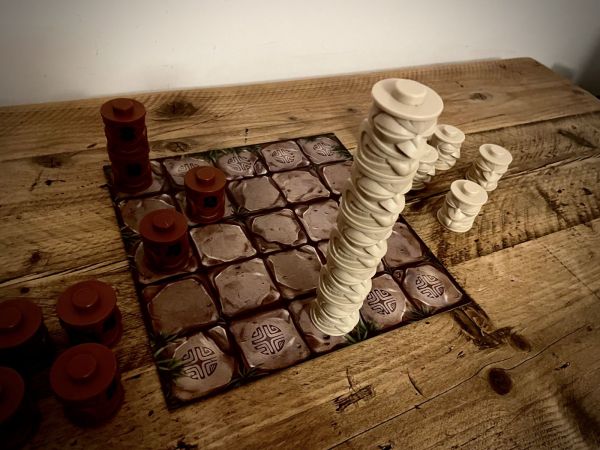
Review
TacTiki combines dueling, tactics, planning, memory, and deduction into a unique game. It reminds me of a game of chess but with significant novel mechanics that make it stand out. It has a feeling of a traditional abstract board game.
The game experience of TacTiki is intense and engaging. Players challenge each other's tactics to gain control of the board. At its core, the game is about two players competing and planning for domination in a five-by-five grid by tactically placing their pieces and strategically trying to reach the endgame goal. The game requires strong analytical and strategic thinking skills and a keen eye for spotting opportunities to form powerful tactics. Every move brings new possibilities into play, making the game infinitely variable. By combining strategy with memory, TacTiki creates an intense gaming experience that can keep novice and experienced players entertained for a long time.
TacTiki falls into the category of a LIGHT abstract game with a DEEP strategy. TacTiki is easy to learn but can be very challenging. It asks the player to keep strong thinking and planning skills. You must plan your moves carefully and ensure your opponent does not outsmart you. It is quick and easy to set up and tear down, and downtime is usually low if the player does not go into "analysis paralysis" mode.
TacTiki features a background theme that works as an aesthetic addition but does not affect the fictional involvement of the game. The main components used in TacTiki are of the highest quality. Each god miniature is big, attractive, and looks outstanding. The intricately detailed pieces feature unique designs that bring the game to life. The material involvement of TacTiki adds an additional layer of immersion to its gameplay. One very disappointing "component" is the actual game board, made of standard cardboard and does not match the expectation of a "traditional" strategy game. The game board has average quality and will deteriorate with time. A vinyl, wood, neoprene, or similar board would have been a welcome addition to the game.
Player interaction is exceptional as TacTiki is an unforgiving competitive game. The game has no designed uncertainty; it is deterministic and does not apply dice or any other arbitrary random element. The gameplay is determined by performance contingency; the players have full agency and control of their own pieces. TacTiki relies significantly on tactics and deduction; the best player has the highest chance of winning.
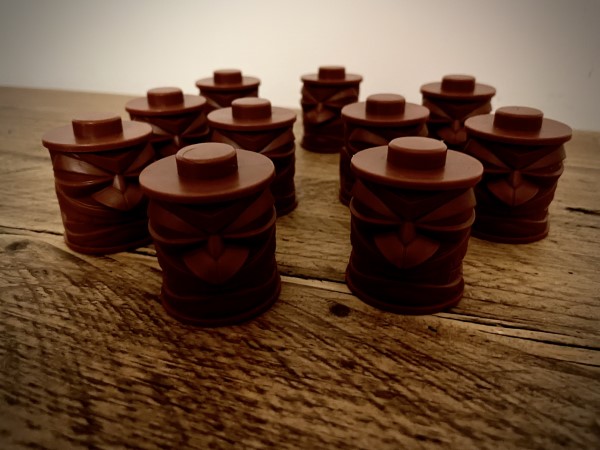
Final Thoughts
Overall, TacTiki is a competitive, enjoyable, and engaging game that requires a combination of strategy and tactics. It's a great way to challenge your mind as it tests your ability to plan ahead and remember key moves from earlier rounds. With its huge miniatures and simple rules, TacTiki makes an excellent addition to any board game collection.
TacTiki is a simple but outstanding abstract strategy game that reminds me of traditional games but introduces novel mechanics that combine tactics, memory, and deduction in a unique game.
Pros:
- Light and quick, but challenging tactics that are hard to master.
- Outstanding, high quality, and huge TAC and TIKI miniatures.
- It succeeds in combining strategy, deduction, and memory into an abstract strategy game.
- It is not for hardcore gamers but perfect for casual ones.
Cons:
- The board quality is deluding and does not match other components.
- Newbies will have a hard time competing against experienced players.
Disclosure: we received a complimentary review copy of this game.
Note: This article is provided by Roll & Mind.










